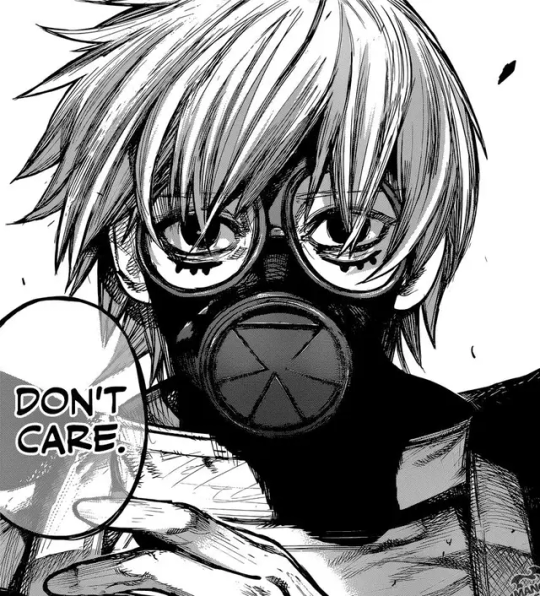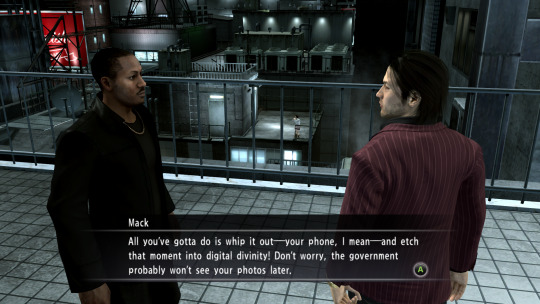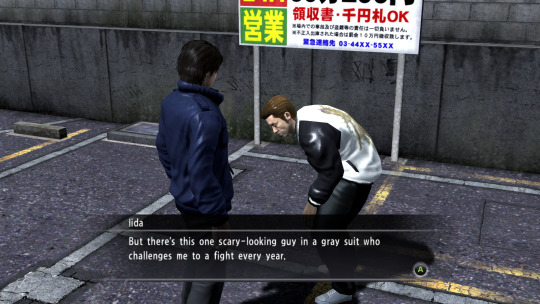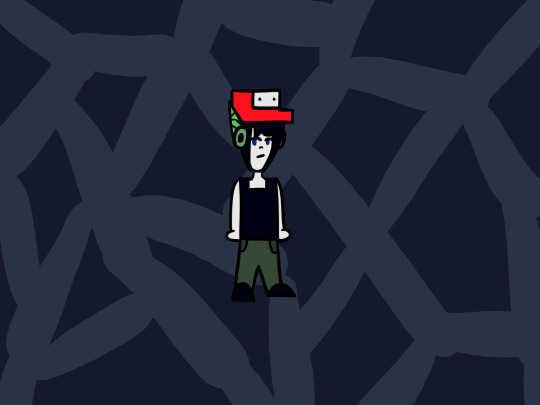#and the tought part is
Text
I do love creating games in college and all but god 4 years non stop of making a game every six months have left me so burned out that I don't even know if I want a job in the industry anymore
#kia text#nothing for me coming close to the feeling of seeing a story that you wrote being translated into a game#but men it does gets tiring writing non stop something you are not passionate about#don't get me wrong I love the game we are making now but god#it's really hard to balance telling the story with the gameplay#one side the game design team (3 people really) want me to make a character dialogue shorter and simpler#but on the other side the art team (1 person) says that the dialogue fells too simple#like I don't know what you want me to do here#I dunno#just tired of creating stuff that doesn't speaks to me#and the tought part is#in the end nobody really reads the script I write#or the articles I spent days having meltdowns over#just fells like nothing I do really matters#god I don't think I ever heard someone saying “wow you did a good job” apart from my mom#and I don't know if my job is really shit and people just don't wanna tell me#or if nobody truly cares#sorry everyone#i'm just venting#just frustade with things I guess
1 note
·
View note
Text
I just want to talk about the fact that Alex saw the two most important Men in his life disappear in the middle of the night and wake up in the morning not finding them.
His father left suddenly in the middle of the night when he was a child, and Henry left in the middle of the night just as he was about to declare himself.
And he just found himself alone in the morning without them.
#prince henry rwrb#rwrb#rwrb book#rwrb alex#rwrb spoilers#alex claremont diaz#henry fox mountchristen windsor#alex x henry#alex clairement diaz dad#yeah i’m just reading the part with alex and henry and thinking about this#so yeah here#i Hope i was right with is dad fact#just some angst tought you know
39 notes
·
View notes
Text
I feel weirdly... fragile today. if someone asks the wrong kind of question at CYC this evening I might tell them everything.
#a non zero part of me also wants to cut deeper again..... :/#tw suicide#tw sh#tho toughts of suicide and self harm are separate
11 notes
·
View notes
Note
could you look at the translation differences for "It's better to be hurt than to hurt people?" it's kind of basic, but i've always found it to be a heavy line, though imo it sounds kind of awkward and clunky in english
Good old classic!
After googling for hours I could not find a single source for that phrasing. Even when I checked the anime, the subs I got were (albeit extremely similar) not a word for word of this infamous quote that gets reposted along with extremely wrong quotes like "why should I apologize for being a monster". The dub is different as well - and the manga is another beast entirely.
For the sake of context - as it explains the phrasing - I kept the lines around it. When it comes to the manga, I took the entirety of what Mrs Kaneki says in that first page of ch61. As for the anime, I also grabbed the two lines that come before, spoken by Mrs Kaneki, as they're what comes in the middle of the two famous sentences in the manga, but right before in the anime.
Here are the different phrasings I found:
The Repost: It's better to be hurt than to hurt people. Nice people can be happy with just that.
The line in the manga:
Viz Media: Be somebody who knows pain instead of somebody who hurts others. You don't need to be rewarded if you have love and kindness in your heart, Ken. That's all kind people need to be happy.
Twisted Hel Scans: Instead of a person who hurts others, become the person who gets hurt. It is okay if you lose because of your love and kindness, Ken. A kind person only needs those things in order to be happy.
Leo Scans: Rather than a person who hurts others, become the person getting hurt. It's all right to lose out with love and warm feelings, Ken. A kind person finds happiness in just that.
Glénat: Au lieu de blesser ton prochain, essaie plutôt de comprendre sa douleur. Tu auras tout gagné si tu fais preuve d'amour et de gentillesse, Ken... même si cela semble aller contre tes intérêts. Car à elle seule, la gentillesse permet de connaître le bonheur. (Rather than harming your neighbour, try to understand their pain instead. You will have won everything if you show love and kindness, Ken... even if it seems to go against your own interests. Because kindness on its own makes you able to know happiness.)
The line in the anime:
English subs: (Mrs Kaneki) Ken, it's okay to feel loss. Nice boys like you can be happy with just that. (Ken) It's better to be hurt than hurt others. People who are nice can he happy with just that.
English dub: (Mrs Kaneki) Ken, it's okay to feel sadness from loss. As long as you remember to stay kind, you'll find joy again. (Ken) It's far better to feel pain yourself than to inflict it on others. As long as you remain kind, you will find joy again.
French subs: (Mme Kaneki) Ken, tu peux être perdant. Les gens gentils sont heureux comme ça. (Ken) Il vaut mieux être blessé que blessant. Les gens gentils sont heureux comme ça. (Ken, you can lose. Nice people are happy that way. || Being hurt is better than being hurtful. Nice people are happy that way.)
French dub: (Mme Kaneki) Ken, ce n'est pas grave de perdre. Les garçons gentils comme toi peuvent vivre avec et être heureux. (Ken) Il vaut bien mieux être le blessé que celui qui blesse. Les gens gentils l'acceptent et sont heureux comme ça. (Ken, losing is not a big deal. Nice boys like you can live with that and be happy. || It's way better to be the hurt one than the one who hurts. Nice people accept that and are happy that way.)
So as you could see, they all talk about loss, pain and their relation to happiness - but they do so in different ways. Sometimes the change is subtle, sometimes it's glaringly obvious and makes you wonder if they're translating the same text (looking at Glénat).
To hurt, or not to hurt, that is the question:
This is the main point. What drove Mrs Kaneki to overwork herself, what pushed Ken to accept abuse from her and everyone else. What if he hurts their feelings if he speaks up? Better to shut up and endure. Again. And again. Until he can't anymore (Shironeki). Until it's back (Haise). Until he can't anymore (Black Reaper). Until it's back (Kingneki). Until he can't anymore (Dragon). Until he doesn't care anymore.

The panel will be relevant in the analysis, you'll see! Because both this quote and this panel fuel my understanding of Kaneki's character journey: freeing himself from motherly teachings (all mothers)
[readmore because what the fuck did this become holy shit]
The repost, "It's better to be hurt than to hurt people.", is concise and straight to the point. This is, after all, what makes the best repostable quotes as they're easy to remember. I am unsure where this phrasing began but it's no wonder it's the one that took off and remains in the collective mind The Quote associated with Kaneki (other than made up quotes RIP). This conciseness is probably what makes it come across as clunky: no space for weaving words into something pretty. I want to say it's boring but there are the opposition between the passive and active voice and the comparative that are worth looking into.
For people who don't know anything about grammar or don't have that stuff in their language, in the active voice the subject acts the verb, while in the passive voice the subject undergoes the action of the verb. When transposing a line from active to passive, the subject of the passive is the object of the active.
Example: Donato kills children. -> active voice. Subject: Donato. Object: children. VS Children are killed by Donato. -> passive voice. Subject: the children. Donato? the agent (aka the one who actually does the action of the verb)
You get it? Now let's go back to our sheep goats:
What this sentence says is that, above the verb of "hurt", it's more advantageous to be passive in your own life. Action incurs risks beyond your direct control - but by being passive, you know exactly what's coming at any time.
The comparative is interesting too. It's better. It's a comparative of superiority. There are three forms of comparative: superiority, inferiority and equality. Here, equality wouldn't work anyway as a hierarchy is established between the action and the passivity. But what's interesting about the use of the comparative of superiority here is that it puts passivity on a pedestal, lifts it above the action. It paints it as good. And more than good, better. With a comparative of inferiority, "it's worse to hurt than being hurt", it says that both actions are bad but one is clearly under the other and therefore you should prioritize the 2nd, aka being hurt. It would acknowledge the bad parts of the passivity while saying that there are more bad parts in the other option so better choose that one. Here, it goes the other way around. Being hurt is pushed onto the reader and Kaneki, it's not a reluctant choice by deduction of what's the least bad option here.
Kaneki has no choice here. He didn't even actively choose passivity, it was pushed onto him: that's saying how passive he is.
I'm gonna jump straight at the English subs. Why? Because the phrasing is very, very similar. Probably where the quote originates. As a reminder, "It's better to be hurt than hurt others." What differences? 1) no "to" in front of hurt -> I admit I do not know enough about English grammar to comment this, but I'll still comment the effect it has aurally. 2) "others" and not "people".
Let's start with the first difference. I said I'd comment on the sounds so here goes: "to" is a word comprised of two letters, one vowel and one consonant. That consonant is "t", which is an occlusive (or plosive). An occlusive is a sudden, more or less brutal sound, that cannot be maintained. As a result, it sounds harsh. Consonants work by two: one voiced (using vocal cords), one voiceless (without using vocal cords). Voiceless consonants tend to sound harsher. Compare g and k. Compare t and d. Compare b and p. These are the plosives. K, T and P sound harsher. So let's look at the sentences. I'll put the plosives in red. Repost: It's better to be hurt than to hurt people. EN subs: It's better to be hurt than hurt others.
Do you see where I'm going with this? Removing a "to" and swapping "people" for "others" removes a brutal aspect. And see in what part of the sentence it happens? In the part about not being the one to hurt. Even the language adapts to that. Beautiful.
That overabundance of plosive in the repost probably contribute to the clunky feeling but can also be seen as alliteration to represent the hurt, like it definitely in the subs version, since they disappear when we move from the self onto others.
Speaking of which, what about "others"? The way I perceive it, "others" puts a distance between the enunciator and whom they're talking about, while "people" is just completely general. You mustn't hurt people: don't hurt anyone. You mustn't hurt others: don't hurt people who are not you. So of course, on top of going well with the softening of the sounds, it enhances the message wonderfully. It's okay to be hurt but people who aren't you better not be, you hear me? Don't retaliate.
Additionally, I can't help but think, when I seen "than to hurt people", about what Kaneki says when fighting Furuta: he'll save people, and ghouls too. In which case, people means humans - and that'd go for the repost as well. After all, Kaneki never had much trouble decimating ghouls!
Now we're moving onto... The French subs! as a reminder, "Il vaut mieux être blessé que blessant", aka "It's better to be hurt than hurting." We're starting with a complaint about the English language because hurt can both mean something and its opposite. For real this TG sentence could be "it's better to hurt than to hurt" and I hate that I love that it's a possibility. Language is amazing. Parenthesis closed, let's move on. The first part can be analyzed the same as before with the comparison. But there is more and there are subtleties that make my brain sparkle tho so let's dig!
Literally, "valoir" (conjugated here as "vaut") means being worth. We use it with the impersonal and comparative to mean basically the same thing as "it's better" but the literal translation of "it's better" is "c'est mieux". "ce" -> neutral demonstrative, "est" -> is, "mieux" -> comparative of superiority of bien (good). So why use "valoir", here? Because, unlike "c'est" which comes across as objective, "il vaut" introduces subjectivity. It is worth for the person talking.
Now onto my favorite part of that sentence: the polyptoton!! For people who don't know it's the repetition of the same word root but with a different ending/form/nature. Here? "blessé" and "blessant". They are both forms of the verb "blesser", which means "to hurt" (as in "inflict harm" and not "suffer"). Both are in the participle form: blessé is the past participle and blessant is the present participle. Used with the verbe être (be), they are verbal adjectives (basically adjectives but coming from a verb). And as verbal adjectives, the past participle expresses the action as passive while the present participle expresses the action as active. We already talked about the active and passive so it's the same thing here as before, really, but with a wonderful aural addition, the polyptoton.
Did you notice something with the French subs? There's no object to that second "hurt", blessant. Unlike with the conjugated verb blesser which takes a direct object, here, a complement would have to be introduced with "envers" (toward). There is none. The sentence ends here. So what effect does that have on our sentence? It makes it general. In general, it's worth more being hurt than hurting. No exception. No precision. It sounds like a proverb (which the polyptoton really helps btw lol).
Now that the anime subs are out of the way, let's look at... the anime dubs! French dub first because it's very similar to the subs. "Il vaut bien mieux être le blessé que celui qui blesse." So what differences? 1) the intensive adverb "bien"! 2) substantivated past participle 3) relative clause as a circumlocution of sorts.
We'll start with the intensive adverb "bien". Bien can mean a variety of things and can even be various natures. Most of the time, as an adverb, it tends to express the manner, and as such it can be translated as "well". But here, it's an intensive. It reinforces the adjective that follows it and can be translated by "far", "much" or "way" when followed by a comparative like is the case here (and as "very" when a positive, if you're curious). This sentence is strong. Not only does it use the verb valoir and its subjective lense but also it accentuates it with the intensive. We're not in the proverb category anymore, we're in the moral lessons.
Now for the next change. Remember past participle of blesser? "blessé"? Can be used as adjective and therefore becomes "verbal adjective"? Well this bad boy can also become a noun. This procedure is named substantiviation. It serves to designate a general category of people doing or undergoing the action of the verb. "le blessé" therefore means "the one who is hurt". Now why use that? See, with the definite article, we're reducing the range, we're saying there's only one. We know the conflict we're talking about, we know the kind of person we're talking about. It's no longer a state you're in at that precise moment like with the adjective: no, the noun reduces you to that specific state of being. If you are "le blessé", there's no getting out of that label. You are hurt and you forever will be because it is now your core qualificative.
This is particularly interesting when paired with what comes right after: the relative clause to designate "the one who hurts". A relative clause can be either descriptive or defining: here is clearly the second. But while it does put a label on "celui" (the one), it is not inescapable like a substantive, this is - albeit a defining one - an add on to who you are. You can stop hurting other people, but you can't stop being hurt by others.
This is interesting because "celui qui blesse" and "le blessé", both singular, one substantive, the other demonstrative pronoun, create a dichotomy, but the relative clause can make you question the legitimacy of this dichotomy.
Now, are you getting tired of the passive VS active opposition? Fear not, the English dub doesn't use that! "It's far better to feel pain yourself than to inflict it on others." Two active verbs, we love to see it!
We still find the usual comparative of superiority with the intensive "far", nothing new, so I'll be fast: comparative of superiority paints the action as positive, pushes it onto the viewer, doesn't acknowledge its negative aspects. The intensive pushes that three notches upward and basically paints it as the only viable option, pushing the sentence into the "moral lessons" category.
Okay now let's look at the novelty! "feel pain". There's nothing passive about this. Sure, it's not an "action" as we would ordinarily describe it but the voice isn't passive and that's important. You cannot "be hurt" without an outside force, that's the nature of the passive voice. Here, feelings can happen on its own. It is not necessarily something caused by outside factors, it can be sadness, it can be sickness, it can be twisting your ankle, it doesn't matter anyway: what's important is the resulting action: feeling.
Feeling is something personal, subjective. You can't physically share your feelings. Every individual will feel differently. Dumb example but I'm thinking about the "menstrual cramps simulators" where people who were used to them were like "whatever" while others were writhing on the floor in agony. This idea is reinforced with the pronoun "yourself".
Here's what's fun about "yourself": it implies that the pain you would have inflicted onto others is now inflicted on you and if you don't feel the pain yourself it gets thrown onto others, and not necessarily the people who've cause you this hurt (aka vengeance), no we're looking at the cycle of violence here.
And while "feeling" is a pretty neutral verb, "inflict" is very much not! It's not even trying to be subtle, especially paired with the comparative etc we talked about before. This is a strong sentence, every bit of itself reinforcing the others, this sentence is unshakable, I love it in its structure and the implications are lovely when it comes to characterization: if Mrs Kaneki isn't hurting, it's her sister who is - and the pain she gives Ken is her failure to feel that pain herself. It's the cog of the vicious circle expressed wonderfully in this sentence.
We're now done with the anime, which is the way most people saying that sentence experienced Tokyo Ghoul. But what about the original? By original I mean manga - and not Japanese, that I haven't learnt in the time between starting this post and writing these words.
We're starting with my favorite scan group: Twisted Hel Scans. Here is what they write: "Instead of a person who hurts others, become the person who gets hurt." Boom, we're entering something entirely new and all the manga translations follow that: "instead of/rather than" and not a comparative of superiority. Did the anime not use the line from the manga? I wonder. But this is not our topic. We're discussing the impact of each of them.
What does "instead" bring that the comparative doesn't and vice-versa? "instead" acknowledge the other option. It's redirecting. It sees the path laid in front and says "hey look at that other path over there". It's guiding but not forceful. It gives you a choice by putting the two options on the same level. No moral value put on one or the other.
It's guiding in the sense that it uses an imperative. "Instead" brings to the imperative the notion of tip or counsel, and not an order, especially when we look at the verb used. It's not a random imperative, no! It's "become". It's a stative verb, not an action. It's a change of being. You have the choice to change or not. You currently are either "a person who hurts others" or at the crossroads to decide which one you get to be.
Now here's what I love with this translation: the articles. "a person who hurts others", "the person who gets hurt". There are countless people hurting others, they are faceless, indefinite, we don't care. But there is only one person getting hurt. Implied here is the people who hurt inflict that hurt on The Person. Everyone is hurting the same person, who then becomes the victim, the recipient of everyone else's violence, like a scapegoat. Someone will have to suffer anyway: choose on what side of that suffering you want to be.
Leo Scans says almost the same thing: "Rather than a person who hurts others, become the person getting hurt." The differences are "rather than" and the gerund instead of the relative clause. As far as I could search I couldn't find any difference in meaning between the relative and participial clauses in such cases so that's that.
However, unlike THS, Leo says "rather than" and not "instead of". As I said, "instead" offers you the choice to change - "rather", on the other hand, expresses an opinion, and even more than that: a preference. Indeed, as you can see from the -er suffix, rather is originally a comparative. And what did we say about the comparative? That's right. Subjective. It doesn't behave like "better" we saw earlier, though. In fact, it does the opposite: it pushes one option down, puts it in negative light before elevating the other. Leo phrasing has contempt for the people who hurt others while THS phrasing sounds more neutral.
Are you ready for the official translations? I'm starting with Viz Media because Glénat is pretty different from all the translations until now. Viz Media's phrasing was as follow "Be somebody who knows pain instead of somebody who hurts others." Aah~ do you see it? Difference.
Starting with the first word, because that's how sentences work: "be"! Wonderful, wonderful "be"! Imperative! Stative verb! But not one that expresses a change, like "become" we saw earlier, no! no, it's the OG. It doesn't accept a previous state of being nor a state of becoming, no. This imperative is doesn't call for growth or change, it calls to be. Static, unchanging. Definite.
This time, no substantivation, no article: only indefinite pronoun + relative clause, both times. No difference of treatment grammatically between the two options. Both options are equally represented: there's no power imbalance, no change of meaning hinging on the smallest word, no. The frequency of both parts is the same. The parallel construction is gorgeous and the balance is completed with the somewhat neutral "instead of": giving a hint, maybe already placing you in the other basket and telling you to get out, but placing no preference grammatically.
Another big change is "knows pain" and not "gets hurt" and variations. This one is no passive action: on the contrary it's a call to reflection and knowledge, an invitation. Is the knowledge physical as implied in all the other phrasings we've encountered? Is it an academic kind of knowledge as Mrs Kaneki cultivates her son's love for reading? Is it a matter of empathy?
While Viz lets us ponder the meaning of that "know", Glénat is definite in its answer: "Au lieu de blesser ton prochain, essaie plutôt de comprendre sa douleur."
We immediately focus on the second part of the sentence "comprendre sa douleur" (understand [your neighbor]'s pain) because that's what we stopped on the previous one. Glénat doesn't give Mrs Kaneki the benefit of the doubt: it makes her completely reasonable. She insists on empathy. She doesn't mean "oh yeah go be bullied no problem", she says to try to understand people, what makes them the way they are, what is hurting them to cause them to act that way - and so Ken understands his mother's pain and therefore understands why she's so violent with him. This one is not a call to passivity at all. Interestingly, it doesn't actually say anything about action.
"au lieu de" is "instead" pretty much word for word, but it's paired with "plutôt" which is "rather" pretty much word for word again. So there is an insistance on the imperative.. And what does that imperative say? "be"? "become"? No. Not a stative verb this time. No passive either. We have "try". This is important as it allows failure. You can't always understand people who hurt you and that's okay but you should always try to understand what hurt them. Active and, I want to say, way more difficult than the passivity the other ones called for.
Then there's "ton prochain"... I translated as "your neighbour" as "ton prochain" is almost only ever found in religious context nowadays "aime ton prochain comme toi-même" for example and the way I keep finding that sentence in English is "love your neighbour as yourself". So Glénat's translation is loaded with religious subtext. And may I remind everyone what a religious "neighbour" is? The one who helps you in your time of need, the one that takes pity. This is no random "others" or "people" like the English translations, no this is very specific: don't hurt people who mean you well.
Glénat's translation is diametrically opposite to the others, as Glénat does: no notion of experiencing the hurt, no notion of not hurting anyone, no absolutism. Basically love your neighbour 2.0, with a added subtext that mommy is the neighbour and if she hurts you then you'd better try to understand why before you make it worse.
Glénat's translation is the one that made me add this picture of Kingneki talking to Furuta, dismissing his hurt, his reasons, to act the way he does: in that moment, Kaneki discards the motherly teachings and doesn't try to care anymore. He doesn't care to be hurt either. He doesn't care not to hurt others. He's already killed countless, what's one more. He takes priority on his "neighbor" indeed but he doesn't try to understand them and their pain either (leaving Touka on the sidelines again and again and over again for example).
This feels a tad jumbled for a conclusion but hey! this is a conclusion jumbling all 9 translations, give me a pass, will you?
#tokyo ghoul#tg meta#i guess?#tg translations#kaneki ken#i. have not reread it entirely yet. i reread the previous part each time i started a new one tho so hopefully there's nothing aberrant#if you read to the end please please leave a like even if you tought it was stupid or something#i need to know if people read posts this long#because there are two more parts hopefully to come to this thing
5 notes
·
View notes
Text

#My first tought when I saw this part of a video#steam powered giraffe#spg#spgiraffe#the spine#hatchworth#spg rabbit#steam powered giraffe hatchworth#the spine spg#rabbit spg#hatchworth spg
121 notes
·
View notes
Text
1984 drinking game: take a shot everytime Winston goes on a rant about how women are brainwashed prudes that aren't available to him 💀
#my mind#1984#1984 george orwell#bro I tought when people talked about misogyny in 1984 they only meant the part where he imagines killing and raping his coworker but no#he regularly goes on rants about women 💀#he's literal an incel#this does not reflect well on george orwell as a person in my eyes
40 notes
·
View notes
Text
Bumblebee? What are you doing?!

OMG NO, DON'T JUMP!!! YOUR WINGS DON'T WORK LIKE THAT!
#transformers#bumblebee#tf rotb#rise of the beasts#new trailer#my first tought when I saw this part of the trailer#rxtvugyvyg#i' m so hyped!#transformers rotb
36 notes
·
View notes
Text
im back with more yakuza screenshots
...

really god wallpaper

gee wiz i wonder who this grey yakuza is

#also gotta admit saejima part didnt suck as much but man i still didnt like it#tanimura at first tought he was boring but after some time i started to relly like him#i sure hopenhe appears in yakuza 5 :)#also wtf i tought the rubber bullets thing was the craziest plot twist but the 10 billion yen from jingu in Yakuza 1 was actually to fund#the okinawa penitentiary why did everyone that talked about yakuza ignore this#also how the fuck did that dude from 3 survive he got shot by cutscene bullets#anyway tags so this reaches people#196#ryu ga gotoku#r/196#yakuza#196 campfire#yakuza 4
18 notes
·
View notes
Text
One of my fav things from sonic is that he's got special moves with his friends and most of those are variations of "throw like ball really really hard"
3 notes
·
View notes
Text
Random thought:
The reason Abbachio is stingy with his Stand is because it is not a combat Stand. As viewers we know that Moody Blues is what it is from the beginning, it is a representation of how Leone cannot leave the past behind and does not need a Combat Stand, because he can defend himself (the strongest member of the gang and all).
But what does it mean for the people of the universe to not have a combat position in jojo's? that you are weak and, therefore, easy prey. Who would like to be easy prey in the mafia?
6 notes
·
View notes
Text

ME BACK, ME SILLY CAVE STORY DOODLE
Sooooooo I finally beated the Blood Stained Sanctuary and Ballos, so my final veredict isssss......
*queue drum roll*
Cave Story is good videogame, nobody expected that!
So yeahhhhhhhhhh, if you actually care I havent been posting because im trying to learn how to do anatomy (not really succeding as you can se right there) and been playing Animal Crossing City Folk (Some people dont like that game butplaying it emulated kinda removes the stupid desing decicion of using the Wii Mote for menuing and the game is actually kinda fun) anywaysssssssssssssssssss yeeeeeeah, Cave Story fun, Play it.
Also also i forgot to mention, i had a little fun here and gave quote green pants, I will now draw quote with green pants and only green pants, this quote is now my oc "Green Pants Quote". If you draw quote with green pant accidentally or on purpose expect me to file a lawsuit.
#Cave Story#ive also finished Rave Story#silly mod that ignoring some of the frustating and weird level desing parts its actially kinda gfun#hopefully ill give my toughts abouyt animal crossing in the future hgere#maybe probably most likely not#okay enough silly tags byeeeeeeeeeeeeeeeeee
4 notes
·
View notes
Text
The Red Logs: Return to the Temple Ch. 20

Ch. 20: Ending Notes (Utility Post)
Masterlist
Chapter 1
Ao3 Link Here

Well holy fuck I actually finished something. Part one of a who knows how long this’ll be, but I finished it! This is the first long fic I’ve ever finished before so I’m extremely proud. :> Unfortunately, the end is kinda cliffhangery lol. Sorry-but the idea was too good to not do! The next work in the series, The Red Logs: Murder in a Bar will come out in weekly installments after I’ve fully written the story (hopefully). Due to the nature of the fic, that feels like the best choice. So it may be another year before TRL’s sees the second fic in the series. Until then, I hope you’ve enjoyed The Red Logs: Return to the Temple. There’s a lot more TRL’s story I want to tell, so don’t worry. It’s not the last you’ll see of Anya and the boys. Thank you for reading. Feel free to come into my ask box to scream (positively) about the fic.
Now I'd like to say thanks to a few people who either encouraged me, were beta readers, and/or helped iron out wrinkles in the story!
Thank you to my partner and best friend, @inconsistent-at-best aka the one and only, Perry the Platypus. You listened to me plot, rant, and read this fic a hundred times over and I'm so lucky to have a partner like you rooting me on in my silly little hobbies.
Thank you to my fellow smut connoisseur and resident master in all things force related, Peter! He doesn't have a tumblr but I'll be sure to show him this xD You helped me a ton with plotting things out by being a sound board. Also without your in depth knowledge about the force, this story would be lacking much luster.
Thank you @wolveria for encouraging me when I felt like interaction was too low and helped me realize the internet is a finicky place and that doesn't reflect the quality of my art.
Thank you @midnight-sun-01 my first fan and now dear friend. Your words of encouragement meant a great deal to me over this year of writing. I'd rather your in depth squeals of joy over thousands of kudos any day. May all your writing endeavors go as smoothly as Crosshair's sliding. (You know when he does his lil leggy thing-you know)
And finally, thank you reader for coming so far on this journey with me! I hope to see you in the following fics, as I have a lot more of Anya's story left to tell. Until then, may you find your blorbos in ao3 bliss.
(If you'd like to be tagged when the next series of the red logs comes out on tumblr, leave a comment below!)

Dividers by Djarrex
#star wars#the bad batch#the bad batch fanfic#tbb fanfic#the red logs: return to the temple#crosshair/oc#crosshair/anya tought (oc)#crosshair x oc#crosshair x anya tougt (oc)#oc x crosshair#oc/crosshair#long fic#complete fic#part of a series
5 notes
·
View notes
Text
Now talking in a positive way about the miniseries. I actually enjoyed this despiction of the black rabbit
Not only because it is a doe, but because I really feel here a more interesting representation of that "naturalness" of death.
Don't get me wrong, I love the black rabbit stories in the book and their mentions, you do get that theme across there. It's perfect, it's good and I really want to see that story animated someday.
But to my personal taste, that "creepy" side is not so much to my liking. That scary rabbit hole with sick rabbits, extinguishing some beavers and stuff is like oh yeah, and the "rabbit hell" depictions I don't know.... Of course again, it's a representation of that fear that one feels towards death, and more so for a rabbit, an animal that knows it could go at any instant. (Although well it might get a little lost with at the end of the book it's not even the black rabbit who takes Hazel, so.)
Now, this isn't just something from this miniseries, the movie had already done that. The black rabbit is more of a "representative" thing. It's silent, instantaneous and calm, almost like an illusion. And I really like that idea more, that you feel that "naturalness and acceptance" towards death, because it's something that will happen eventually.
Plus it adds to the fact that in the end Hazel leaves this world in the most "honorable" way possible, peacefully as an old rabbit who saw a lot of things. His voice, though gravelly, is subdued and friendly.
Now in the miniseries she doesn't differ much, beyond that her interactions are more "direct". At the end she is similar to the movie one, only appearing as a illusion for brief moments. Now her voice is just as dominant, somewhat cold but at the same time peaceful, perhaps maternal (by the way, personally his voice in Latin Spanish is more in tune with this).
And that phrase that she says "all walk with me, but it is for a brief moment called "life" that rabbits leave my side." It's beautiful, it seems so goofy or whatever, but it fits well with all of this. Adams once said it, there is no animal almost as close to death as a rabbit.(well, maybe some mouse too) This phrase fits that idea like a glove.
This is why I like this depiction so much, it's one of my favorites.

(By the way, the one in the TV series is the one I like the least, because it's basically the summary of that "creepy rabbit hell" I mentioned before and I hate that autotune edgy voice detail. His voice already sounded perfect without editing).
#watership down#i hope anybody wants to crucify me after this#sorry not sorry#the black rabbit of inle#watership down miniseries#lepur says#lepur stupid toughts#this just come bc i was thinking about the death part on my rabbit/hare folklore#i feel really sad about the miniseries because REALLY HAVE WONDERFUL IDEAS but much of them were used on a very poorly shitty way#dumb dumb ideas
7 notes
·
View notes
Text
da quando mi sono trasferita ho passato sì e no 5 giorni a casa e a saltare, mai di fila, per questo questi giorni di malattia mi stanno distruggendo, non vedo gente da una settimana, il cipralex non fa un cazzo, mi sento come se stessi soffocando h24
#pensieri intrusivi di qua pensieri intrusivi di là#sono giorni che sto combattendo contro la voglia di conficcarmi un coltello nella gamba e poi leggo post del cazzo sugli intrusive toughts#porcodio#per non parlare del fatto che prima di partire ho buttato una lametta che avevo messo da parte e ora come ora vorrei morire per averlo fat#mi viene da vomitare
2 notes
·
View notes
Text
Still embracing this braclet that day was unforgettable to me and i still have the urge to cry whenever i think of it but i use it more as my strengh point than my weak point it may be a very small act and very simple gift for almost everyone else but to me this bracelet is the most precious jewel i own and i'll ever own along with its necklace. I miss them and i wish them a safe and happy journey, all of them.

#some personal thoughts pls ignore#as someone who never like the idea of being a parent since forever#i have formed a bond with those kids as if they were my own#those ones specifically#in my first day of the job i already knew the biggest part of it is that i had to deal with kids#but i was already very nervous cuz i knew i wasn't the type of person that can be good enough to be in a kid's memories#i already had very tough past encounters with teachers in my life and i know how big of a responsibility it was#and i was terrified#but over time when i watched them grow up and become their own poeple#i felt so proud and so full of life again#they aren't even my own children im not old enough to be any close to their mom#but it left a huge print in me to just think of how i watched them grow#the very first kids i had to go back to tgerapy to get my shit together so i won't accidentally hurt them like my past teachers did#but THEY tought ME lots#and i just don't know how to explain it#the education season is back so that's why i wore it today#sorry for ranting too much#story time
4 notes
·
View notes
Text
i have discovered that apparently i was subconsciously shaped as a person thanks to flint lockwood from cloudy with a chance of meatballs and i feel quite of a bit odd about that
#it was so weirddd like i remember really really liking the movie when i was little#but i have never tought how much it influenced the me part of meself#like what the hell why do i share so many mannerisms and stims with this character HOW#anyways thats bout it#personal#gh0ost txt#also the humor of this movie is like my kind of humor is epic
6 notes
·
View notes